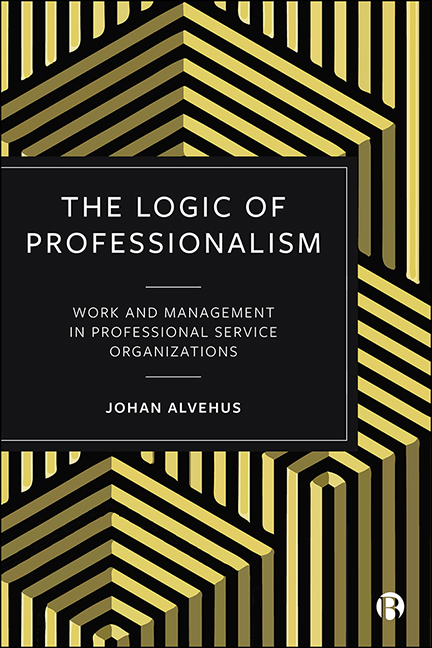Book contents
- Frontmatter
- Dedication
- Epigraph
- Contents
- About the Author
- Preface
- 1 Work in Professional Service Organizations
- 2 Professionalism from an Institutional Logics View
- 3 The Ambiguity of Professional Service Work
- 4 Control, and Control over Control
- 5 The Politics of Leadership
- 6 Superficial Hybridity
- 7 Understanding the Logic of Professionalism
- 8 The Future of Professional Work
- References
- Index
8 - The Future of Professional Work
Published online by Cambridge University Press: 30 April 2022
- Frontmatter
- Dedication
- Epigraph
- Contents
- About the Author
- Preface
- 1 Work in Professional Service Organizations
- 2 Professionalism from an Institutional Logics View
- 3 The Ambiguity of Professional Service Work
- 4 Control, and Control over Control
- 5 The Politics of Leadership
- 6 Superficial Hybridity
- 7 Understanding the Logic of Professionalism
- 8 The Future of Professional Work
- References
- Index
Summary
In the beginning of this book, I dubbed professionals the gold-collar proletarians of our age. Gold collar, as their work is normally associated with high status and high wages. Proletarians, as it is still wages – the ‘free professional’ of old is largely an anachronism. At the same time as the status of professions and professional workers is upheld in society, however, ‘terminal decline has been a feature of many seminal accounts of the professions and remains influential’ (Muzio et al, 2019, p 25). In this book, I have tried to keep to a reasonably non-evaluative view of professionalism. Now of course there is no such thing as a completely value-free social science, but in the context of scholarship on professional service organizations, the problem seems to me that there is sometimes an unnecessary polarization between different camps.
On the one hand we find profession romantics, to whom professionalism is inherently good and the right to secluded professional judgement should always be protected. Control from external stakeholders (clients representing market logic, politicians representing bureaucratic logic, and so on) is from this position always presumed to be negative. In my view, this position blinds itself to the problems inherent in professional monopolies and the power professions hold. Scandals in accounting, in medicine, in finance, and not to speak of the often outrageous and insubstantial claims made by management consultants (a good study to consult [sic!] is Kirkpatrick et al, 2019), should be cause for concern. The much-criticized New Public Management (I have touched upon it occasionally in this book; see Hood, 1991), we must remember, was thought up for good reasons, such as a perceived over-dominance of professions and concerns for ever-increasing costs in for example health care. In short, profession romantics seem to fall prey to the opaque transparency maintaining professional logic. We should also remember that academics are also a profession, and I don't want to point fingers, but it is certainly easier to find comfort in a position that helps to legitimize one's own autonomy. The true cynic would even argue that maintaining theories based on profession romanticism is a key strategy for academics to defend their own jurisdiction. (See also Watson, 2002, who makes a similar observation.)
- Type
- Chapter
- Information
- The Logic of ProfessionalismWork and Management in Professional Service Organizations, pp. 116 - 131Publisher: Bristol University PressPrint publication year: 2021



